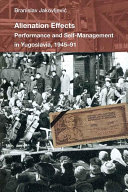Year
1987
Publisher
University of Hawai'i Press
Type
BOOK
Category
Social Science
Language
English
Pages
227
ISBN
978-0-82488-076-7
Last Update
09-Sep-2024
Keywords
SOCIAL SCIENCE / Anthropology / General
Related
See More
Alienation Effects, Performance and Self-Management in Yugoslavia; 1945-91, Performance and Self-Management in Yugoslavia; 1945-91

Building a Successful Palestinian State

Climate Change as a Threat to Peace

Dança e diferença

The Global Horizon

The Defense and Veterans Brain Injury Center Care Coordination Program